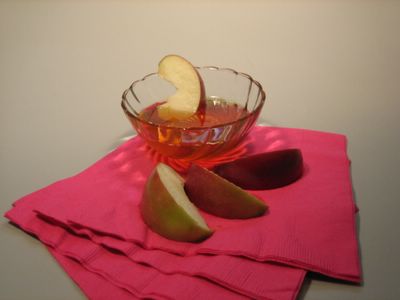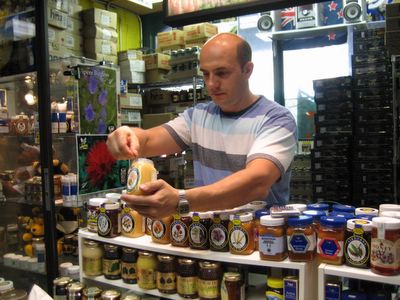
Honey glazed carrots (I add ginger marmalade to the mix) accompany chicken and meat dishes that are mellow rather than spicy. And then there's dessert...no home would be without it's special version of honey cake.
When I was growing up my mother made tayglech every year. It's a gooey, sticky confection of pastry balls cooked in honey. Everyone (except me) loved them and my mother would make them for all her sisters and brothers as well as for us for the New Year celebration. I, on the other hand, could never get used to the smell of the dough cooking in the honey for an hour.
So, knowing that there are a great many varieties of honey, I thought I would do a little research on the subject and go to the Dufferin Grove market where there are some honey sellers in hopes of getting some inspiration for this week's SHF. Unfortunately, they weren't there this week, so I went to the St Lawrence market to talk to Oleg Konashenkov

of Honey World and find out all about honey.
First off, Oleg had me taste a variety of honeys to distinguish the subtle and not-so-subtle differences. It reminded me of going to wine tastings at the vineyards near Niagara-on-the-Lake. I learned about which trees and flowers produced which types of honey. Some are medicinal, like Manuka honeys from tea tree that are used to cure everything from burns to stomach problems, sore throats to acne. Some are mild in flavor, some tasted a little like pine trees (that's the Christmas favorite in New Zealand, apparently). Some are very liquidy like Nodding Thistle, while some are thick and more caramel-like. Queen Victoria's favorite was Pohutukawa and mine is Tasmanian honey from the flowers of the Leatherwood tree. After tasting at least 10 varieties (I think about a half a cup in total), I decided I might just be a honey person after all.

Hi Ruth,
ReplyDeleteThanks for posting on my blog. :) Wow, you did more than all of us did -- actually going to a honey store and researching up on it! Sure wish we had a store like that here in Manila.
I hope to "see" you again at the next SHF! :)
No doubt about it - I love these SHF and can't wait for the next one.
ReplyDeleteUnfortunately for me, I don't live near a market with vendors so it's hard to find different varieties of honey.
ReplyDeleteRecently however, I found out about this company called Holy Food Imports which imports their products from Israel. Perfect if you stick to a strict kosher diet as I do.